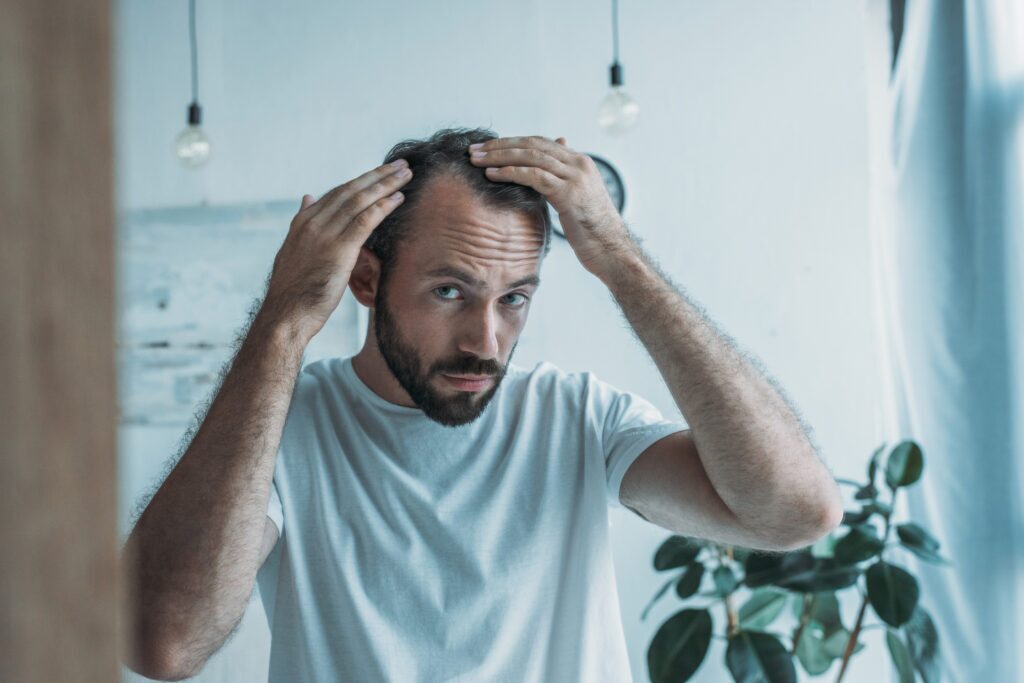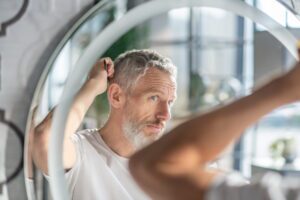Medical Review by Jennie Stanford, MD, FAAFP, DipABOM
Summary:
- Knowing the root causes of hair loss, like genetic predisposition and nutritional deficiencies, can help you and your medical provider choose an appropriate treatment.
- A diet rich in protein, omega-3 fatty acids, and antioxidants plays a role in maintaining healthy hair and may have the potential to help you manage hair loss.
- While some herbal remedies like saw palmetto and ginkgo biloba may benefit hair growth, they come with risks, such as limited research, potential side effects, and uncertain product quality.
- Scalp massage can increase blood circulation to the scalp, potentially stimulating hair follicles. Essential oils like peppermint and rosemary oil may also promote hair growth.
- A holistic approach including stress management and lifestyle changes can often support the use of FDA-approved medications for hair loss.
Essential oils, herbal remedies, light therapy, & more
There’s no shortage of methods men have used to try to prevent and reverse hair loss over the years—but not all of them are equally safe or effective. When it comes to natural treatments, it can be difficult to know which methods are worth using as part of your plan for dealing with hair loss and which ones aren’t. Fortunately, we’re here to help.
Below, we walk you through your options when it comes to natural hair loss treatments so you can understand which ones might support you and make choices that support your long-term health.
Key factors contributing to hair loss
Understanding the root causes of hair loss can help you choose the right treatment approach. Generally, hair loss happens for one of two major reasons:
- Hormonal Changes: Hormones play a significant role in regulating the hair growth cycle. Imbalances of hormones called androgens can lead to thinning hair or accelerated hair loss. This type of hair loss, known as androgenetic alopecia, is the most common cause and is often hereditary.
- Nutritional Deficiencies: A lack of essential nutrients, like iron, protein, and certain vitamins, can also adversely affect hair health and growth.
Supporting hair health with dietary choices
What you eat can have a major impact on how healthy your hair is, so making certain changes may help preserve its thickness and quality. Here are some tips for tailoring your diet to support hair growth:
- Protein-Rich Foods: Hair is primarily made of protein, so make sure you have enough protein in your diet. Protein malnutrition has been linked to hair loss.
- Omega-3 Fatty Acids: Omega-3 fatty acids may help modulate certain androgens and promote hair growth. You’ll find them in many seeds, nuts, fatty fish, avocado, and extra virgin olive oil.
- Antioxidant-Rich Fruits and Vegetables: Foods high in antioxidants may help protect hair follicles against oxidative stress, which can lead to hair loss.
Vitamins & minerals
Certain vitamins and minerals are widely considered important for hair growth. Try consuming more foods with high levels of the following:
- Iron: Iron deficiency is a common cause of hair loss, especially in women. Foods like meat, fish, leafy green vegetables, and beans contain high levels of iron.
- Vitamin D: Low levels of vitamin D are linked to alopecia. Although the effects of vitamin D supplements on hair loss need more research, not getting enough sun is a common cause of vitamin D deficiency—so spending a bit more time outdoors may help.
Herbal remedies
Several herbal remedies have become popular among men seeking hair loss solutions. While there are many herbs marketed and sold to help with hair loss, there are fewer evidence-based ones. A few examples include these:
- Saw palmetto: Some studies suggest that this herb may reduce hair loss due to its ability to balance hormone levels.
- Ginkgo biloba: Known for improving blood circulation, ginkgo biloba may help with hair loss by increasing blood flow to the scalp.
What to consider before using herbal remedies
While herbal remedies can be beneficial, it’s important to recognize that research is limited. Because many herbal treatments have not been extensively studied or validated in clinical settings, it’s not always possible to find information on how they might interact with prescription medications or what they actually do to address hair loss.
It’s best to consult with a qualified medical practitioner before taking any treatment—herbal or otherwise—for hair loss. Expert guidance is essential for creating a safe and effective plan for you.
Scalp massage & essential oils
Improving your hair health can start right at the roots. Scalp massage and essential oils are popular natural approaches to dealing with hair loss.
Gentle scalp massage has been shown to increase blood circulation to the scalp. The extra blood flow may be able to stimulate hair follicles and promote hair growth.
Several essential oils may also demonstrate properties that promote and support hair growth. Here are two popular options:
- Peppermint oil: May encourage hair growth when applied topically in a 3% solution.
- Rosemary oil: May be as effective as 2% minoxidil after six weeks of use, according to some studies.
Light therapy
Light therapy, using specific wavelengths of light, has emerged as an innovative home treatment option for dealing with hair loss. Here’s a quick overview of how it works:
- Light therapy devices emit red or near-infrared light, which may stimulate hair growth by increasing blood flow and reducing inflammation in the scalp.
- Regular, consistent use as directed is key for seeing potential benefits.
- While initial studies have shown promising results (especially for low-level light therapy combined with topical minoxidil or oral finasteride), more research is still needed.
Lifestyle Changes
Certain lifestyle modifications can support hair growth as well as your overall well-being. Since stress and poor circulation can both contribute to hair loss, you might want to try physical or relaxation exercises in addition to eating a balanced diet rich in nutrients. Here are some examples:
- Meditation
- Yoga
- Regular exercise, like running or lifting weights
Consult a medical practitioner about your hair loss
While natural treatments may offer a compelling alternative to traditional therapies, it’s important to understand their scientific basis so you can make informed choices for your health.
It’s best to explore treatments with some scientific backing or studies demonstrating their effectiveness. Additionally, you should always consult with a healthcare professional to ensure any natural treatment you’re considering is appropriate for you and won’t interact with existing medications or treatments.
Find support from Lemonaid Health
Lemonaid Health can connect you with healthcare practitioners based in the US for online consultations that can help you determine the most appropriate strategy for dealing with hair loss.












